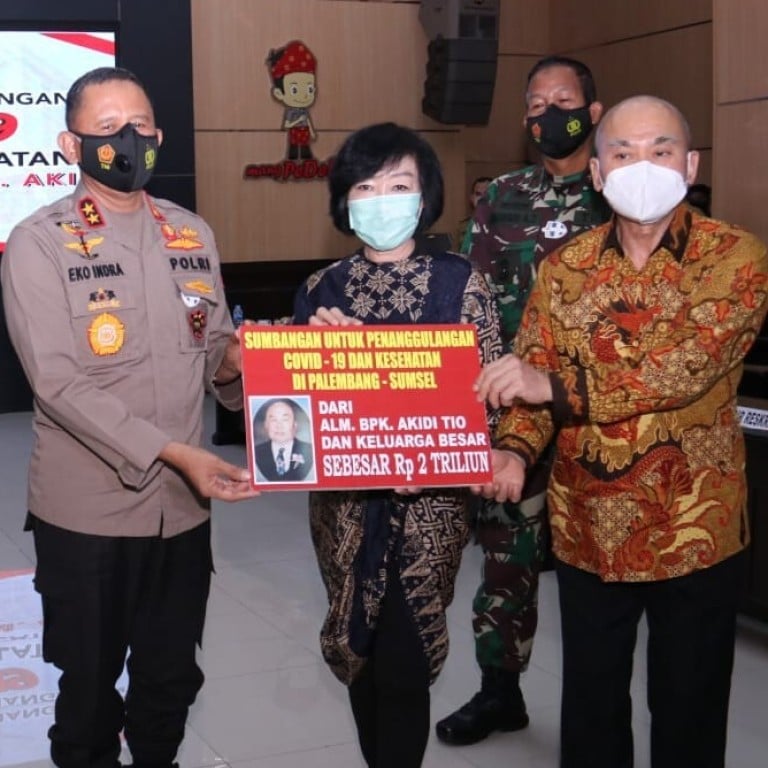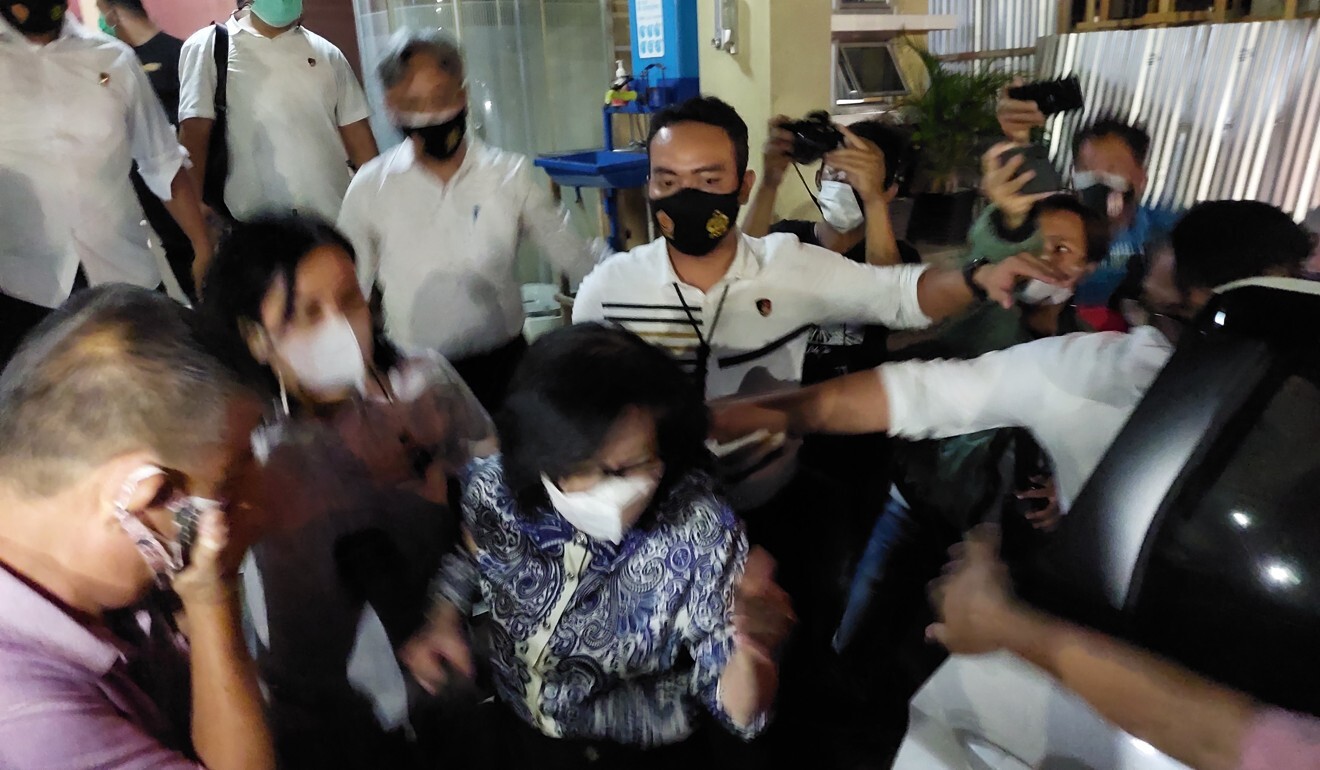
Indonesians baffled by suspicious 2 trillion rupiah ‘donation’
- The curious case of the dead businessman, an infamous styrofoam board and a never materialising offer of aid to a community hit by Covid-19 has gripped the nation
- Public excitement that greeted news of the donation has turned to anger, some of which has been directed towards minorities due to the Chinese ethnicity of some of those involved
The strange sequence of events began on July 23, when the South Sumatra police chief, Inspector General Eko Indra Heri, was contacted by Professor Hardi Darmawan by telephone.
Darmawan, the director of Charitas Hospital in Palembang, had previously served as the personal doctor of Akidi Tio, a mysterious Indonesian businessman and philanthropist, for 48 years before Tio’s death in 2009.
According to Darmawan, Tio’s children, and in particular his daughter Heryanty Tio, had asked him to work as an intermediary as the family wished to donate 2 trillion rupiah in aid money to the city of Palembang to be distributed to the community.
In the days that followed, Heryanty’s husband, Rudi Sutadi told the media that, “the money was part of his [Akidi Tio’s] will. If we don’t use it then we, the children, will suffer from karma.”
Darmawan also said that Tio, who was originally from Langsa in Indonesia’s Aceh province, made his fortune in construction and palm oil and was known as a philanthropist before his death at the age of 89 in 2009.
Police chief Heri agreed to receive the funds, which were handed over in a symbolic ceremony on July 26 during which Tio’s daughter Heryanty presented the police chief with a colourful styrofoam board accessorised with a picture of her late father to represent the money she said would be released on August 2.
It was careless [of the authorities] to not do any due diligence
News of the donation quickly spread and was widely reported in glowing terms in the media, with police chief Heri announcing that the money would fund free oxygen and medical supplies for the public, bonuses for medical workers and the construction of isolation centres in South Sumatra.
Indonesia has become the epicentre of Covid-19 cases in Asia in recent weeks as a result of the more aggressive Delta variant, coupled with low vaccination numbers and limited contract tracing and testing. To date, the country has reported more than 3 million positive cases and, on Wednesday, it reached the grim milestone of more than 100,000 deaths. Meanwhile, South Sumatra has reported more than 40,000 cases of Covid-19 and more than 2,245 deaths.
But the public’s excitement about the donation soon turned to anger when the money promised by the Tio family failed to materialise by August 2 as promised.
The same day, Heryanty and Darmawan were called in for questioning by the South Sumatra police on suspicion of “spreading false information” and “dishonouring the nation”, both of which are crimes in Indonesia.
“There should have been a procedure for accepting the money, not just a rush to have a public ceremony because of the large amount involved,” said Eko Juniarto, the co-founder of Mafindo, an Indonesian fact-checking organisation.
“I myself watched the ceremony and thought that it was true that there was a 2 trillion rupiah donation.”

“It was careless [of the authorities] to not do any due diligence,” he continued. “This is also a cultural problem of taking things at face value when someone says they want to contribute billions or trillions in aid, and people tend to just believe it. It doesn’t mean that this is bad, but when it comes to money it is better to be careful.”
That the Tio family is also ethnically Chinese and therefore a minority in Indonesia has also inflamed the already tense situation, according to Juniarto.
“There were oblique comments made about ethnic minorities [following the news] and even conspiracy theories put forward because there was no official word from the government on this. Because the family is an ethnic minority, it serves as ammunition for those who are already anti-minority. Meanwhile, one of the duties of the police is to maintain peace and a conducive situation for the general public,” he said.
What is important is substance. Whether the funds are there or not
Asked whether the donation might have been hit by a processing delay, the central bank said transferring money within Indonesia was relatively easy and there were no limits on the amount that can be transferred.
“What is important is substance. Whether the funds are there or not,” Hari Widodo, a representative for Bank Indonesia in South Sumatra said.
Heryanty has not been formally charged with a crime. Legal experts say the laws surrounding public donations are unclear anyway and some hope the case may help focus attention on this lack of clarity.
“One issue is whether it is a crime if you don’t pay a donation that you promised, but another issue is whether investigations into any promised donations and their origins are an effective way of preventing corruption in Indonesia,” said Christopher Panal Lumban Gaol, who lectures on corruption at Santo Thomas Catholic University in Medan.
In recent years, there have been cases of suspected corruption surrounding donations meant for the public good.
In world’s Covid epicentre, Indonesians help each other as trust in government falters
Ratna Sarumpaet, an Indonesian activist and politician, was accused by police of paying for plastic surgery from a bank account that had also been used to collect donations for victims of the Lake Toba ferry disaster in 2018.
In December 2020, Juliari Batubara, the former minister for Social Affairs, was arrested on suspicion of receiving 17 billion rupiah in bribes from suppliers of Covid-19 social assistance who were tasked with delivering food parcels to the needy.
Meanwhile, this is not the first time Heryanty has been questioned by police, according to Hisar Siallagan, the director of the criminal investigation department of the South Sumatra police force. Siallagan said on August 2 that Heryanty had previously been questioned in Jakarta in connection with a 7.9 billion rupiah fraud case in 2020. However, the case was dropped in July 2021, and Siallagan said that it had “no connection to the case we are handling now”.
On Thursday, police chief Heri publicly apologised for his role in agreeing to the donation, an apology that was accepted by Poengky Indarti of the National Police Commission, who appealed for calm and reiterated that the police would continue to try and get to the bottom of this peculiar series of events.
“We hope that [the apology] will be the end of the matter,” she said.
“On the other hand, we support the South Sumatra police force in continuing its investigations and asking for clarification from Heryanty and any other witnesses regarding the promise of the 2 trillion rupiah donation.”


